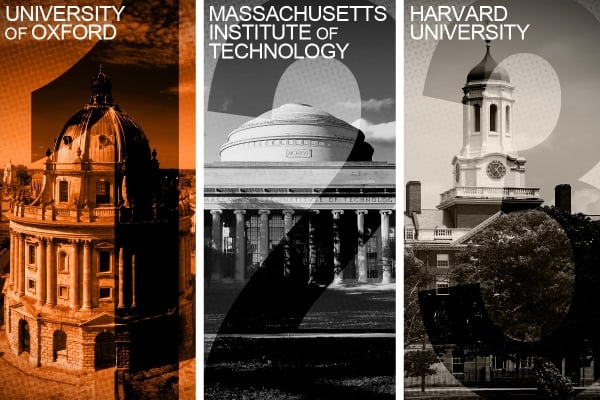

Although American universities still dominate rankings, their global reputation is on a downward trajectory, according to Times Higher Education’s 2025 World University Rankings, released Tuesday evening.
The reputation score is part of Times Higher Education’s (Inside Higher Ed’s parent company) comprehensive annual university rankings, which use a total of 18 performance metrics—including those related to teaching, research and knowledge transfer—to rank higher education institutions across the globe.
To calculate reputation, which counts for about a third of Times Higher Education’s overall rankings, researchers examined two years of survey data from a statistically representative distribution of scholars worldwide who were asked to name up to 15 universities that they perceived to be the very best in the world for both research and teaching in their fields.
According to THE’s analysis of 93,000 responses and more than 1.2 million votes, 38 percent of votes went to American universities this year, down from 47 percent nearly a decade ago.
“U.S. schools in general are receiving a smaller and smaller share of the overall votes, meaning that they are less likely to be named as being among the very best in the world by scholars worldwide,” Phil Baty, Times Higher Education’s chief global affairs officer, said in an email.
“That doesn’t necessarily mean that they are understood to be in decline—simply that there are other emerging world-class universities in other countries that our respondents are now more likely to name, supplanting the U.S. schools,” Baty said. “In particular, we’ve seen Chinese universities rising. As their research output and research quality improves, we see that this means that their academic standing is also improving—at the expense of the U.S.”
Specifically, the research reputations of both the U.S. and the U.K. have declined over the past decade, with the U.S. dropping from 46 percent of votes in 2015 to 38 percent in 2024, and the U.K. declining from 18 to 12 percent. Meanwhile, China’s research reputation increased from 2 percent of votes to 7 percent between 2015 and 2024.
The research reputation of universities in the United States has declined over the past decade.
Times Higher Education World University Rankings
Although skeptics have long questioned the value of university rankings, a reputation score “makes a difference in terms of where people want to study and where faculty members may want to take a job,” said Philip Altbach, professor emeritus at the Center for International Higher Education at Boston College. Still, he noted that the methodology of getting such information can often be “problematic,” because it’s based on perception that allows “the rich get richer because they’re known,” making it “hard for others to catch up.”
“Just asking questions about reputation doesn’t tell us much that’s useful,” he added. “We should look at rankings more holistically.”
In conjunction with its rise in collective reputation, China also had the fourth-highest number of universities in the top 200 World University Rankings; its top-ranked institution, Tsinghua University, ranked 12th among individual universities. In the categories of teaching and research environment, two Chinese institutions—Tsinghua and Peking Universities—ranked in the top 10.
“The rankings in general infuse global competition into higher education,” Altbach said. “That’s good because it makes governments more interested in spending money in supporting universities. It makes the universities want to come up in the rankings because it looks good and it’s a way of measuring how well you’re doing.”
The gains Chinese universities have made in reputation and other metrics come at a time of intensified concern among American lawmakers about technological competition with China.
Nicholas Dirks, CEO of the New York Academy of Sciences and a former chancellor of the University of California, Berkeley, said that while “reputation matters over the long term, [it’s] not clear how much it matters in the short term.” He added that it “can be affected by everything from the general turmoil that has been associated for the past year with elite universities to the many geopolitical factors that may discourage the global movement of top faculty and students to U.S. universities.”
What’s clearer is that many Americans are increasingly worried about their country falling behind international competitors, according to a 2023 report from the Science & Technology Action Committee, a group of 25 nonprofit, academic, foundation and corporate leaders focused on strengthening American science and technology.
Such information points to “a growing concern within the U.S. about the fact that government investment in science continues to be flat, even though private sources of funding continue to increase,” Dirks said. “That concern is especially strong in relation to the steadily increasing investment in scientific research in China, and that may also be driving some measure of the shift in global reputational rankings.”
U.S. Still Dominates the Rankings
Despite China’s expanded investments in academic research in recent years, American universities still dominate the global higher education rankings.
By country, the United States had the most universities ranked in the top 200, with 55—though that’s down from 59 in 2021—followed in order by the United Kingdom, Germany, China, the Netherlands, Australia, Canada, South Korea and Switzerland. The U.S. also had 23 universities in the top 50 and 38 in the top 100—up from 36 last year.
And despite the decline in reputational scores, U.S. universities were the best represented among the top 10 overall universities for 2025, which is based on submissions from 2,860 universities in 133 countries—the highest response rate the survey has had in a decade.
The University of Oxford received the top spot in the Times Higher Education rankings for the ninth consecutive year.
It was followed in order by the Massachusetts Institute of Technology; Harvard and Princeton Universities; the University of Cambridge; Stanford University; the California Institute of Technology; the University of California, Berkeley; Imperial College London; and Yale University.
The No. 2 ranking marks MIT’s best performance yet, whereas Stanford fell to sixth place—from second—putting it at its lowest position in the 21-year history of Times Higher Education’s rankings.
Other notable ranking improvements for American universities this year included the University of Massachusetts—tied for 84th—which entered the top 100 for the first time; the University of California, Irvine, which jumped from joint 92nd last year to joint 90th this year; and the University of Rochester, which climbed from 127th to 133rd.
“With US universities dominating the top 10 there is intense competition with the country’s elite institutions jockeying for position with relatively significant rises and falls in the top ten,” Baty, of Times Higher Education, said in a news release. “While the reputation of US universities is the highest in the world, amongst academics, its decline over recent years has been quite significant and its global reputation is at a record low with US global reputation for excellence and prestige in major, steady global decline.”






